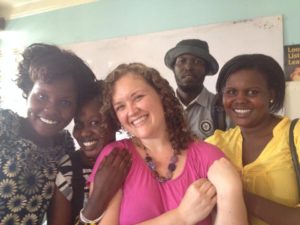Missed the first post? Grab it here.
 Last Thursday was one of those days that encapsulated so much of what I love and what drives me bananas about living in Uganda. I veered through jaw-clenching traffic on the 45-minute drive home, assembling all the clutter of my day into the appropriate mental file folders. This is quite a task to begin with–considering both a) my mind and b) at least four sudden oncoming governmental convoys. (Let’s just say mental “papers” kept being upended from their file folders by real life.)
Last Thursday was one of those days that encapsulated so much of what I love and what drives me bananas about living in Uganda. I veered through jaw-clenching traffic on the 45-minute drive home, assembling all the clutter of my day into the appropriate mental file folders. This is quite a task to begin with–considering both a) my mind and b) at least four sudden oncoming governmental convoys. (Let’s just say mental “papers” kept being upended from their file folders by real life.)
As I do every week, I’d taught Bible at the refugee center. Even after three years, it’s a bit of a rabbit hole for me. There are so many cross-cultural experiences to make sense of at once that I’m flying by the seat of my skirt.
In class, we’d talked about the Bible’s teachings on money. My husband had cautioned me as I’d kissed him goodbye that morning: Remember, there are a ton of cultural differences here, so tread carefully. And indeed, what I liked about the conversation that day is how talking Scripture with another culture—even simply imagining their perspective—is like unlocking entire pages of the Bible I’d never read. My Western eyes have a lot to learn from African ones. (I’m eager to read Misreading Scripture with Western Eyes.)
 We conversed vigorously about budgeting, about generosity, about the gravity of stuff. And my heart was breaking. As a class, we budgeted for an average African living on 120,000 Ugandan shillings or even 300,000; which, despite the Monopoly-money resemblance, is still $34 or $85 per month. Friends, you can get a lot of things cheaply here. But it’s pretty stinkin’ hard to scale the walls of poverty on that, no matter how much you save. At the same time, their perspective on generosity and simplicity is constant. (Though simplicity is a significant theme for me, I have zero to teach them concerned simplicity!) They spend their lives cutting corners and sacrificing for the greatest need.
We conversed vigorously about budgeting, about generosity, about the gravity of stuff. And my heart was breaking. As a class, we budgeted for an average African living on 120,000 Ugandan shillings or even 300,000; which, despite the Monopoly-money resemblance, is still $34 or $85 per month. Friends, you can get a lot of things cheaply here. But it’s pretty stinkin’ hard to scale the walls of poverty on that, no matter how much you save. At the same time, their perspective on generosity and simplicity is constant. (Though simplicity is a significant theme for me, I have zero to teach them concerned simplicity!) They spend their lives cutting corners and sacrificing for the greatest need.
Ever get that feeling you’re in the presence of people by whom you’ll be dwarfed in Heaven? I was hurting with them. I was humbled.
So that was my Thursday. That and confusing conversations with African friends, and my own normal “what should I do here?” dilemmas (Is it inappropriate for me to give a male student who has no money for transportation a lift in my minivan? etc., etc.). I maneuvered through death-defying traffic, my eyes lingering on the signs of poverty everywhere, which would not likely change much in the next decade. I felt my heart submerging like a stone with the realities here, and the frustration that it seems God’s steering me away from it.
Perhaps what I am trying to paint for you is that Africa has been an Isaac of sorts for me. It has been the thing that is precious; the thing you couldn’t imagine laying down because the work is breathtaking and vital and lined thickly with people. When I think of trying to articulate it, I could describe it at least two different ways.
- Detached and trusting: It’s just something that gives me meaning. And God has indicated it’s time to move on to something else He has for us.
- Attached and grieving: This work is vital and chockfull of purpose and with no completion in sight. I do not understand how moving on could be the best thing—but there are no great options left.
So I’ve written about things like feeling powerless or flirting with bitterness, especially at Christmas, when shouldn’t I be excited having Christmas at home (wherever that is)?
Because it’s time to lay my Isaac down.
But this morning, a very odd passage comforted me. (Perhaps less odd when you consider Tim Keller brought it to light, whom my husband has dubbed “my homeboy.” Alas, I digress.) Perhaps you recall from the book of Revelation the prominent scroll with seven seals. Scholars have agreed this scroll contains “the meaning and purpose of history, the great plan of God for all time.” The apostle John is anguished about no one being able to open it, or “interpret and carry out the plan of God.”
But do you remember who can? A Lamb, looking as though He had been slain. The song sung in Heaven reads, You are worthy to take the scroll/and to open its seals/because you were slain/and because with Your blood you purchased for God/persons from every tribe and language and people…
Stay with me here. My point (and Keller’s): God used Jesus laying down every dream, every “ministry possibility”, every chance to conquer the Rome that enslaved Israel. It was the very peak of evil, as the only righteous man was murdered in a sweeping wave of injustices. And He made it the peak of love. Jesus’ moment of greatest powerlessness was inexplicably, inexorably the greatest moment of power in all time. It was the doorway to not only forgiveness of every evil , every injustice, every poverty of soul and body—but to turning that evil back on itself. Keller articulates,
And so it is a wounded lamb who now is able not simply to judge wrongdoing but to actually undo the damage that evil has wreaked on creation.*
God, I think, is beckoning me to a form of this in leaving. Not to leaning on my own understanding or to pursuing the most visible path for doing His work (I’m sure Paul didn’t see prison as the greatest use of his work for the Gospel…). Not to saving my idea of life. But to losing my concept of “life” for Him; following my big “C” calling more than my little “c”. As much as I feel powerless, I trust God uses my moments of dying for His greatest power.
I don’t know what God’s taking from you right now, or what part of you is graying and curling in death. Wherever this finds you, may you know that in His hands, you are never truly powerless.
Like this post? You might like
- A Note for the Day You’re Feeling Powerless, Part I
- Doubting the Dream Weaver
- Memos to Myself: On Keeping Your Heart Soft When Times are Tough
- The Broken Heart: On Leaving Africa
*Keller, Timothy. Walking with God through Pain and Suffering (2013). New York: Penguin Group. Kindle edition.







